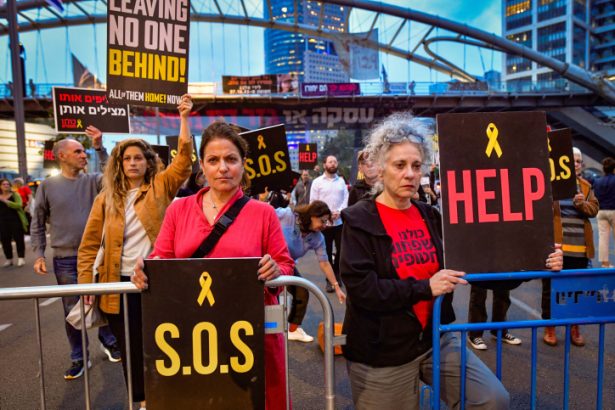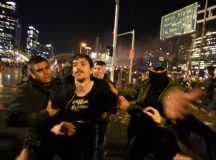Deputy Editor of Fathom Calev Ben-Dor shares reflections from Jerusalem and Tel Aviv as Israel marks 6 months since 7 October
Thursday 4 April – fear and unity
There’s an added tension weighing on the residents of Tel Aviv. I’ve taken the train from Jerusalem to give a geopolitical lecture to a group visiting from Europe and the US who are volunteering for a couple of weeks. The heightened feeling of concern is over an expected Iranian response to the missile strike that killed Mohammad Reza Zahedi, commander of the Quds Force in Syria and Lebanon on Tuesday. Israel military intelligence chief, Aharon Haliva, has warned of complex days ahead, adding that it’s not certain the worst is behind us.
Indeed, fearing precision guided missiles on strategic sites like the electricity grid, the army scrambled GPS coordinates, leaving users of Waze, Gett and Google maps frustrated (it showed them located in Beirut). While for months the Homefront Command recommended people stock water, food and torches in their safe rooms, Thursday saw a buying spree in stores (including generators). My parents, who live in Tel Aviv, call to ask whether we have water in our own safe room / mamad in Jerusalem. We don’t, I tell them, but the fridge is less than 30 seconds away. We are however well stocked with torches, books and games (our mamad doubles as the kids’ bedroom). Were we to be forced to encamp for an extended period of time, it would take a while until we exhausted our collection of Julia Donaldson novels and Disney puzzles. I’m not sure how much this allayed their concerns.
That general apprehension doesn’t stop people from going out. The streets and cafes are full as I meet my friend Joe near Diezengoff Square, which remains adorned with flowers, cuddly toys and photos of those murdered on 7 October. Joe is heavily involved in communal activities in the city, including with many of the tens of thousands of evacuees from Sderot, Netivot and Ofakim who were relocated to Tel Aviv after 7 October. Unlike others, he is broadly optimistic about Israeli society. He tells me of the billboards that were hung on major roads – how the Sderot Municipality thanked Tel Aviv for its hospitality; ‘The heart is in Sderot, we are in Tel Aviv, together we will win;’ How the Tel Aviv municipality hung its own billboards welcoming those from north and south: ‘There’s no place like home. But in the meantime, feel at home’.
‘An unnatural experiment took place in which tens of thousands of people from one part of (generally traditional, Mizrachi) Israel were transferred to another (secular, liberal) part – which they historically viewed with suspicion’ Joe explains. ‘Those billboards are the equivalent of rural Alabama being forced to relocate to Boston or San Francisco and discovering that everyone is really nice, or the equivalent of the State of Texas taking out huge billboards in Manhattan saying “we love New York”. What took place here – a polarised society in which people were forced together and got to properly know and understand one another – is almost impossible to think about in an American context (and would have been impossible to imagine in Israel a year ago). But it happened. This has the potential to change Israel positively for the coming decades,’ he adds.
In my geopolitical lecture I discuss how the war is being fought with different logics consisting of ticking clocks, all on different countdowns. There is a military logic – destroying Hamas’ capabilities – which experts predict might take months (in January, Chief of Staff Halevi said 2024 would be challenging and that Israel would ‘certainly be involved in fighting in Gaza throughout the year’). There is an Israeli humanitarian logic – freeing the hostages – whose timeline is far shorter. It’s estimated that approximately half the hostages remain alive (Nahum Barnea wrote in Yediot Ahronot of how that number changes from day to day but sadly only for the worse.) That timeline isn’t measured in months but rather days. Then there is the international-diplomatic-humanitarian logic, which requires significantly increasing aid, and forging a ceasefire – a goal now shared by Biden, Cameron and all of Israel’s western allies. Their patience is near breaking point (if it hasn’t passed that already). A contact I spoke to lamented that Israeli leaders have no idea of how bad things are in Washington. Netanyahu historically prided himself on being an expert in American politics. But no one else could have so devastatingly united Trump, Biden, Pelosi and Shumer against the country’s current course.
Sunday 7 April – is there a realistic diplomatic route?
Where might Israel go from here diplomatically? I’m working on a BICOM article about Israeli plans for the ‘day after’ in Gaza. One major bone of contention revolves around whether a rejuvenated Palestinian Authority (PA) can become a stable address in the Strip once the IDF leaves. National Security Council head Tzachi Hanegbi wrote in Saudi paper Elaph that Israel could agree to involve the PA in the future of Gaza after it engages in reform. Israel Hayom also revealed that Israel has begun working with local Gazans affiliated with Fatah to coordinate and secure the delivery and distribution of aid in the Strip. At the same time, Netanyahu has warned against Gaza becoming a ‘Fatah-stan’, seemingly ruling out that option. Other Israeli plans published by non-governmental organisations argue that a reformed PA has a crucial role to play in Gaza and call for the creation of an Israeli-Palestinian political horizon supported by Arab states (who are also essential for financing Gaza ‘s reconstruction) that can also help facilitate greater normalisation for Israel in the region.
The civil society and NGO plans are impressive in their knowledge and attention to detail. There are numerous puzzle pieces – a reformed PA; reconstruction in Gaza; normalisation with Saudi Arabia; the weakening of fundamentalist Islam vis-à-vis an Islam that recognises the Jewish people’s deep roots in this land a la the Abraham Accords; a regional security structure that might weaken Iran; a political horizon towards partition – that if fitted together could improve Israel’s situation. Yet they seem to rely on two questionable assumptions. One is that an autocratic and corrupt PA can genuinely reform and Palestinian society deradicalise. The other is that a political horizon can be forged between two societies who couldn’t even find a zone of possible agreement during the Clinton, Bush, Obama and Trump administrations and are now deeply traumatised after the last six months.
It’s easy for many outside (and sometimes inside) Israel to assign the blame to Israel’s far-right government. But even once Netanyahu and his band of not-so-merry men are replaced (and they are far behind in the polls), the Israeli public will remain deeply sceptical of territorial withdrawal. Palestinian society meanwhile is showing few signs of greater openness to recognising the principle of ‘two states for two peoples’ (a principle historically rejected by their leaders). Recent polling from the Palestinian Centre for Policy and Survey Research found ‘armed struggle’ remaining the most popular answer of how best to end Israeli occupation. Seventy one percent believe Hamas’ decision to carry out the October 7 massacre was correct. Netanyahu’s departure from the political scene may improve Israel’s situation in certain areas. But it would not change any of this.
Monday 8 April – rage and fury
The last clock I mentioned in the lecture is the domestic-political one, which has been ticking slowly but is now speeding up. Barricades have returned to my road, and Azza Street is once against closed off. Walking to the convenience store, a terrible smell hits my nostrils. Confused as to whether I have stepped in something, I realise it’s likely the remnants of the dreaded ‘skunk’, a putrid smelling liquid used by Israeli police to disperse demonstrators. It’s over 36 hours on from the nighttime demonstrations (on Wednesday they broke through the barricades by the prime minister’s house), yet the smell still hangs in the air. Further up the road stands a large solidarity tent for the hostages. Pictures are everywhere, as is a long table, originally arranged for a Purim feast, with plastic plates with pita bread – now showing signs of mould – set out for those still in Gaza.
At school drop off I see a friend who spent several months in reserve duty. Back in November he had related the conversations held by his unit. ‘The day the war ends’ he predicted, ‘we won’t go home. Instead we’ll head to the Knesset and to Kaplan Street [the scene of mass anti-government demonstrations in Tel Aviv] and demand the government resigns.’ While I didn’t doubt his analysis, I noted that the key phrase was ‘when the war ends.’ What exactly did that mean – when the last Hamas operative is killed? When the IDF leaves Gaza? When Hezbollah and its elite Radwan force are pushed back from the border? When tens of thousands of evacuees from the north are able to return home?
Increasingly, large swaths of the public seem unwilling to wait. Motivated by rage and frustration (and the beginning of post-traumatic ire) towards what it considers a leaderless, ineffectual, obtuse government, thousands are now taking to the street.
Writing in the right-wing (traditionally but no longer pro-Netanyahu) Israel Hayom, Yoav Limor takes the government to task for a series of diplomatic failures and the loss of international legitimacy. Citing ‘the reckless decision to clash with the Biden administration, the lack of willingness to address the day after in Gaza and comments made by government ministers and MKs in favor of expelling Gaza residents and rebuilding the settlements there’, Limor believes that Israel’s situation is worse on every metric possible. ‘Diplomacy has collapsed, there is economic stress, a security quagmire, and social and political chasms.’ As hostages go through hell in Gaza, the Knesset is set to go on its recess for Passover in what Limor calls a ‘stunning display of being disengaged.’
Yet people also feel directionless, bereft of credible authority figures. ‘The Israeli public has lost faith in the state’s institutions and feels lost,’ Ofer Zalzberg, of the Kelman Institute for Conflict Transformation tells me over coffee in Jerusalem. ‘It’s part of society’s collective trauma – Israelis tend to have serious doubts about relying on the government, the security establishment, or experts.’
Looking ahead, there’s a pessimistic and optimistic scenario for Israeli society. The former is that everyone embraces the ‘I told you so’ argument – whether that’s warnings by the right-wing against the Gaza disengagement or giving the Palestinians sovereignty, or those by the centre-left against the government transferring suitcases of cash to Hamas or being overly focused on the judicial reform / constitutional coup. Yet if everyone believes they were correct, no underlying assumptions will be altered. We will double down, and simply return to ‘6 October politics’. The brutality of 7 October was unimaginable to me. But I can imagine this scenario very easily. It may even already be here. Yehudah Shlezinger in Israel Hayom argues that everything has changed since 7 October – parents not sleeping through the night, children growing up scarred, soldiers experiencing post trauma, the feeling of danger hovering above, our trust in the IDF etc. Everything, Shlezinger adds, except for the politics.
The latter scenario is that Israelis have been indelibly altered by our experiences. The secular, traditional, and national-religious publics who have been fighting cheek to jowl in Gaza for months, showing willingness to sacrifice their lives for one another; Israel’s Arab citizens, who were shocked by Hamas’ lack of distinction between Jew, Arab or Thai; transformed perceptions of Sderot and Tel Aviv residents that Joe refers to. Perhaps even constructive changes will take place within the ultra-Orthodox public.
Tuesday 9 April – A picture I can’t face
On my way to my daughter’s gymnastics class, we always pass the pictures of Shiri Bibas and her two young red-headed children, four-year-old Ariel and one-year-old Kfir. It feels cowardly, but I bow my head a little, trying not to properly gaze at their faces – as if to look, to really look, risks getting pulled into this vortex of the evil forces that kidnapped them. In a now famous eulogy by Moshe Dayan for Roi Rothberg – a security guard from Nachal Oz killed by Gazans in 1956 – Dayan questioned how Israelis ‘shut our eyes to prevent us from looking soberly at our fate, to see the destiny of our generation [having to battle against those who hate us] in its full cruelty.’
Perhaps before 7 October, the public didn’t internalise this. But its now we can no longer evade looking soberly at our fate, to understand the genocidal intent and brutality of some of our neighbours.
Since that dark day half a year ago, I have discussed and argued with friends the extent to which 7 October undermined some basic facets of Zionism. Short-story author Etgar Keret once quipped that he had received a ‘classic Zionist education.’ ‘By the time I left high school’ he jokingly recounted, ‘I knew every place in Europe where a pogrom had happened, but I never learned Kafka was Jewish’. For classic Zionism, Jewish history over there, in the galut, was dangerous. Even when things were good (as they often were), Crusaders, Cossacks and Inquisitors were waiting. Here, in Israel, danger may have still existed. But the stories from our grandparents and history books – of children hiding under their parents’ dead bodies as brutal murderers scoured the scene hunting additional Jews to kill – was just that – a story. Zionism had solved that. We were no longer helpless.
Yet we now know that isn’t quite true. A similar picture to that hung by former Mossad chief Meir Dagan in his office – of his grandfather being humiliated by the Nazis before being murdered – was uploaded live on social media on 7 October by Hamas operatives in southern Israel. A friend told me of how she wants to keep a knife in the mamad ‘because if we’re in danger, the army won’t come in time.’ Public intellectual Micha Goodman talks about 7 October representing a postcard from Jewish history, a reminder that despite the successes, we haven’t managed to extract ourselves from the dangers of the past. We haven’t liberated ourselves from helplessness. I feel a part of that helplessness every time I pass the Bibas family on the way to gymnastics. Its a feeling I both despise and am embarrassed by.
My six-year-old daughter meanwhile remains transfixed within a fantasy world I wish I could jump into. Because how on earth does one bring up Jewish children in the 21st century to soberly look at our people’s fate? Absorbed in her imaginary stories of princesses, fairies, unicorns (and sometimes snow leopards), she seemingly doesn’t notice the pictures or ask about them. For this, at least for the time being, I am grateful.




































